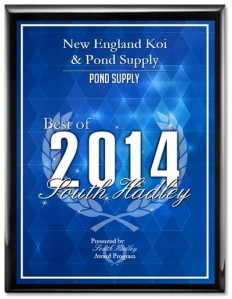Alkalinity Carbonate hardness in Ponds
Alkalinity, often referred to as -carbonate hardness, or German carbonate hardness, is the measure of carbonate and bicarbonate concentrations in your aquarium water. Alkalinity is a measure of the...(click on product image for more details)Ammonia in Ponds
Where does the ammonia originate from Pond fish produce waste in the form of ammonia, which is released into the water through the gills. Ammonia can also originate from the dead and decaying plant...(click on product image for more details)Chlorine in Ponds
Acceptable concentration 0 A gas widely used in the disinfection of water and as an oxidizing agent for organic matter, manganese, iron, and hydrogen sulfide. Chlorine is known to react with...(click on product image for more details)Green Water Algae in Ponds
Sometimes referred to as an algae bloom, Another factor which can influence the pH of the water is the presence of plants, most notably if there is an algae bloom in the pond. During the hours of...(click on product image for more details)Nitrate in Ponds
Nitrate, NO3-N, Nitrate is the final product from the breakdown of ammonia released by the fish. Nitrate is not especially harmful to freshwater fish but is a potent plant fertilizer and can...(click on product image for more details)Nitrite in Ponds
As the ammonia in the water begins to reduce, the secondary break down product, nitrite will begin to increase and this is also very poisonous to fish. Nitrite is a skin irritant and will cause the...(click on product image for more details)pH in Ponds
The pH is in all respects a measure of acidity and alkalinity, pH 0 - 6.99 is acid- pH 7.0 is regarded as neutral and pH 7.01 - 14.0 is alkaline. On the whole the pH is not generally a problem but it...(click on product image for more details)Salinity
Common salt, Sodium Chloride -NaCl- is commonly used in the health care and maintenance of fishes especially Koi. Salt is useful in treating parasites. It will eliminate seven out of nine parasites that...(click on product image for more details)Water change outs in Ponds
Partial water change outs can reduce the amount of anything dissolved in the water but not totally remove it. Although it is sometimes necessary, draining and refilling a pond should only be used as a...(click on product image for more details)Pond Water Chemistry
Most people that are new to water gardening don't think about water chemistry. The best way to prevent problems is to test your pond water regularly for elements that are toxic to pond fish.
These chemical imbalances in a water garden usually have no odor or visual signs until it's too late. Another great preventative measure is to follow routine pond maintenance schedules for spring, summer and autumn. A common thread in all of these is the regular addition of beneficial bacteria.
Below you will find links to various Pond Water Chemistry Topics

